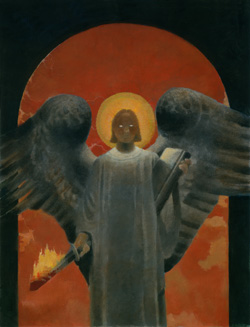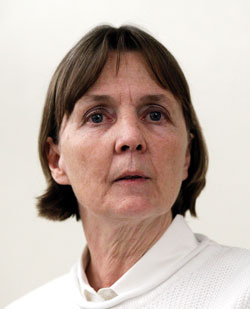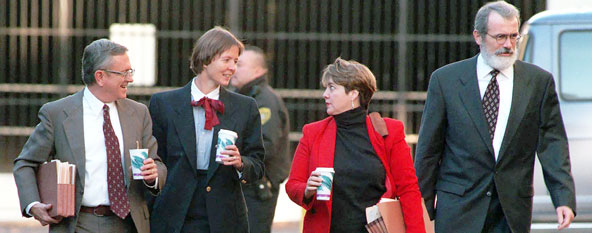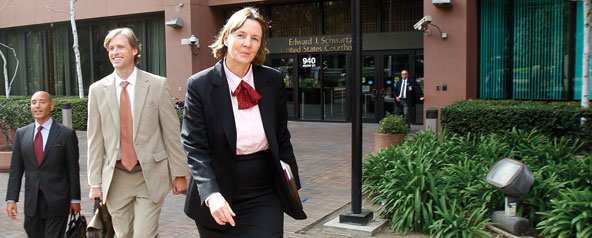Judy Clarke has a knack for keeping her notorious clients off death row

Illustration by Brad Holland
In a South Carolina courtroom 18 years ago, Judy Clarke stood before a jury of nine men and three women and tried to humanize a client who had committed a horrific and inhuman act. Susan Smith at first claimed that a black man carjacked her and her two sons. She later admitted her story was a hoax.
That day, Smith was found guilty of drowning Michael, 3, and Alex, 14 months. She was facing the death penalty. Clarke was asking that her life be spared.
“This is not a case about evil but a case of sadness and despair,” Clarke, a public defender, told jurors inside the old Union County Courthouse. “She made a terrible decision with a confused mind and a heart without hope. Hopelessness is not malice.”
Two and a half hours later, the jury came back and said Smith did not deserve to die. She was instead sentenced to life in prison and would live with the knowledge that she deliberately sent her children buckled inside a car into a lake to their deaths.
The case brought Clarke’s name into the national spotlight and set the stage for a career in which she would become known as the lawyer who keeps killers off death row. An avowed death penalty opponent, her specialty is seeing the humanity and vulnerability in clients accused of some of the most terrible crimes, and seeking a measure of mercy for them so that they may live.
During the Smith trial, Clarke and lead counsel David Bruck created a portrait of a sad, abused and damaged woman whose father committed suicide when she was 6 and whose stepfather molested her when she was a teenager. “When we talk about Susan Smith’s life, we are not trying to gain your sympathy,” Clarke told the jury. “We’re trying to gain your understanding.”
Getting jurors to understand her clients has become the hallmark of Clarke’s work, inspired in large part by the Smith case. In a speech to students at Loyola Law School in Los Angeles this past April, Clarke said she was “sucked into the black hole, the vortex” of the death penalty while representing Smith. “I got a dose of understanding human behavior and I learned what the death penalty does to us,” she said, according to an Associated Press account.
Since the Smith trial, Clarke has represented some of the highest-profile murder defendants in contemporary American history: Unabomber Ted Kaczynski; 9/11 conspirator Zacarias Moussaoui; Atlanta Olympics serial bomber Eric Rudolph; and Jared Lee Loughner, who killed a federal judge and five other people, and wounded former U.S. Rep. Gabrielle Giffords and 12 others. All of Clarke’s clients have been spared death.

Photo of Judy Clarke by AP Photo/Reed Saxon.
UNDERNEATH THE ACT
Now Clarke is going to try to make a case for life on behalf of Dzhokhar Tsarnaev, the man accused in the Boston Marathon bombing, which left three dead and more than 260 injured. She was asked to join the team of public defenders already assigned to the case and no doubt will be tapped for what she does best: humanizing her client.
“As soon as they had a suspect I turned to my husband, who is also a criminal defense lawyer, and said they better hope they can get Judy Clarke on their case,” says Loyola law professor Laurie Levenson, a friend of Clarke’s who helped arrange the April talk there.
Clarke did not respond to interview requests for this article, which her friends and colleagues say is not surprising. Clarke has never sought the spotlight and has always put the needs of her clients first, they say.
“She’s really, really modest, and she’s really humble,” Levenson says. “I think she sees this as her mission as a lawyer. I’m a former prosecutor who’s a huge admirer because I think she’s the real thing.”
The essence of Clarke’s Loyola speech, Levenson says, was that her clients—no matter how horrible the crimes they are accused of committing—are real people and not monsters. The world sees the criminal act, and Clarke tries to understand what caused them to do it.
“Judy is sort of the defense lawyer’s saint of lost causes, taking cases no one thinks can come out with a good result. And she comes out with the best result you can,” Levenson says. “Her clients are not, by and large, exonerated. They do not walk among us. But things don’t end up for them as badly as people initially thought they would.”
Tommy Pope, the lead prosecutor in the Smith case and now a South Carolina state legislator, argued passionately in favor of sentencing Smith to death. He says Clarke was able to touch something in jurors. “It started out as Susan the monster and evolved into Susan the victim,” he says. “One of the things she did was humanize the defendant. I anticipate she will do something similar in the Boston case.”
Pope also believes the public perception of Smith began shifting even before the trial. “I think over the course of time, they were able to change the public face of the defendant,” he says. “As her opponent, I respect her. With her, it’s not drama; it’s not theatrics. But there is an intensity.”

The Unabomber defense team: attorneys Quin Devir and Judy Clarke, jury consultant Denise de La Rue and attorney Gary Sowards on the way to the courthouse in 1997. AP Photo/Rich Pedroncelli
Clarke grew up in Asheville, N.C., and studied law at the University of South Carolina—about 90 miles south of where Smith’s trial took place. After earning her law degree in 1977, she headed west, going to work for the Federal Defenders of San Diego. Clarke and her husband, international human rights lawyer Thomas “Speedy” Rice, have their own firm in San Diego, a home base from which they are often summoned. As a member of the Federal Death Penalty Resource Counsel Project, which helps judges recruit qualified federal public defenders, she is in frequent demand.
Not long after graduating from law school, Clarke began teaching at the National Criminal Defense College, then in Houston. It was there that another young lawyer, Laurie Shanks, met her and immediately became an admirer.
“She had already tried many more cases than I had. What struck me at that time—she was not only brilliant; she was so kind, so generous and so willing to help other lawyers,” says Shanks, now a professor at Albany Law School. “She was a mentor, and at the time there were few women faculty members.”
Shanks, who had started her career as a prosecutor in Maricopa County, Ariz., says Clarke offered valuable lessons. “What I learned is that you have to look at the individual who is branded as a defendant,” she says. “What most people do is look at the crime and then say: How could you represent that person? What I really learned from Judy was to separate those two things.”
She also got some insight into how Clarke works. “One of the things you’ll find out about Judy is that she spends thousands upon thousands of hours with each one of her clients,” Shanks says. “Judy will go in and talk to them about who they are and what brought them to the place where they are.”
It was that kind of commitment that helped Clarke develop and deepen her relationship with Kaczynski. He was a particularly challenging client because he did not favor being marked as disturbed or mentally ill, and at one point he asked the judge to fire his attorneys for pursuing that line of defense.
Kaczynski’s brother, David, who had alerted authorities when he suspected his brother was the Unabomber, had wrestled with turning him in, fearing execution. As David got to know Clarke and the defense team, he felt his brother had a chance. “She had the ability to develop a relationship with Ted, and that was not one of his gifts. He does not connect easily or well with people,” says David, a longtime anti-death-penalty crusader and now executive director of a Buddhist monastery in Woodstock, N.Y.
The long hours Clarke spent with Kaczynski paid off. “She had a real sense of Ted’s humanity. To me that was extremely meaningful and validating,” David Kaczynski says. “I thought, ‘Oh my gosh, she understands my brother as a human being who has significant issues and challenges and mental problems, who’s done something terrible but is still on the level of a human being.’ ”
Kaczynski even grew to like Clarke. “I know at one point Judy had told him she jogged. And Ted had always had a gift for drawing, a sort of cartoonish drawing, and Judy had shown me a picture that he had drawn of her running through the city streets of Sacramento during the trial,” David says. “I thought, ‘Wow.’ It certainly indicated a connection.”
Gary Sowards, a Los Angeles lawyer and Clarke’s co-counsel on that case, says what she brought to it was her deep understanding of mental health. “I think Judy’s strength with clients is just how straightforward and genuine she is. She has a desire not to just get into their head but to listen at a compassionate level,” he says. “Judy is just completely open with people. The thing about clients with mental health issues is that there is this under-the-radar connection you can’t fake.”

Clarke leaves the San Diego courthouse after a hearing in the case of Jared Lee Loughner, whose victims included a federal judge and U.S. Rep. Gabrielle Giffords. AP Photo/Lenny Igneizi
When the stakes are so high, clients facing death must be forthcoming and show their vulnerabilities if they hope to live. “That’s one of the hardest things with capital cases. It invokes people’s deepest, closest-held thoughts,” Sowards says. “Her strength is being open with clients and giving them a sense of safety —that their information is respected.”
THE LESSON: LISTEN
Outside of the courtroom, Clarke has been sharing her more than 35 years of experience with the young law students at Washington and Lee Law School, where her husband also teaches.
“I feel that she taught me to remember to always listen,” says former student Cristina Becker, who graduated this past spring. “Clients are so used to being told what to do. When you listen, they feel more in control and that their lawyer is more trustworthy, especially in dealing with clients with mental health issues.”
When working with students, Clarke shows the same kind of patience and respect she has for clients. “She waits until someone speaks completely. You can tell she’s trying to assess everything, and there’s something refreshing about that,” Becker says. “I feel she literally practices what she preaches.”
Becker recently accepted a job with the Mecklenburg County public defender’s office in Charlotte, N.C. “She was definitely an inspiration,” Becker says of Clarke.
Jonathan Shapiro, an experienced death penalty lawyer based in Fairfax, Va., co-taught a practicum course with Clarke at Washington and Lee. “She is just a fabulous teacher and the kids love her approach,” he says. “She is not didactic. She doesn’t tell them what to do. There is none of that. She helps them develop their own skills on their own.”
Shapiro says students appreciate that. “A lot of professors have pretty good egos and like to flaunt their knowledge and talk about the things they’ve done, and are not hesitant to let students know when they’ve screwed up, in their eyes,” he says. “Judy is not like that. She has no ego that is apparent to me. So the atmosphere is not like those in other law classes. That’s not to say she’s a pushover.”
Becker can vouch for that. “She made it very clear that she was holding us to a very high standard.”
Dedicating a career to public defense work, particularly death penalty cases, is not for everyone. Clarke’s friends and colleagues say she has the gift to see beyond the nature of her clients’ deeds.
“Who can kill a child? Who can plant a bomb in a person’s mailbox? Who can point a gun at a congressperson? If you focus on the crime itself, the only emotion you can feel is revulsion,” Shanks says. “What we’re saying is how can we understand what would bring a person, any person, to do something that was this horrific?”
Nearly two decades after Clarke and the defense team helped Kaczynski avoid the death penalty, his brother remains a supporter and friend. Clarke and the family stayed in touch over the years. Clarke called when their mother was ill and again later when she died.
David Kaczynski understands the agonies that families endure when they have a loved one accused of horrible crimes. He understands the isolation. Clarke helped make them feel less like outcasts. “Just to have a person who has the capacity to help, and the ability to nonjudgmentally understand what you’re going through, is important,” he says. “We owe her a great, great, debt.”
Clarke would probably not want anyone to feel indebted to her. In fact, after the Smith case, she returned the $82,944 fee the state paid her, saying that other indigent defendants could use it more.
“She is completely genuine,” Shanks says. “With Judy, whether she is wearing her little tie or brushing her hair out of her eyes, the reality is that she absolutely, 100 percent believes in her client and what she’s telling the jury—and the jury knows that. She’s respectful of the jury, she’s respectful of the court, she’s respectful of the victim of the crime. And the jury sees that, and that’s why she’s successful.”
Says Levenson: “She has an extraordinary commitment. She’s fearless. She doesn’t get rattled if she has a difficult client and a difficult case. This is what she does. It is her mission.”
This article originally appeared in the December 2013 issue of the ABA Journal with this headline: “Finding Humanity in the Inhumane: Judy Clarke, hired to represent the Boston Marathon bombing suspect, has a knack for keeping her clients off death row.”
Kevin Davis is a freelance journalist based in Chicago and the author of Defending the Damned.



